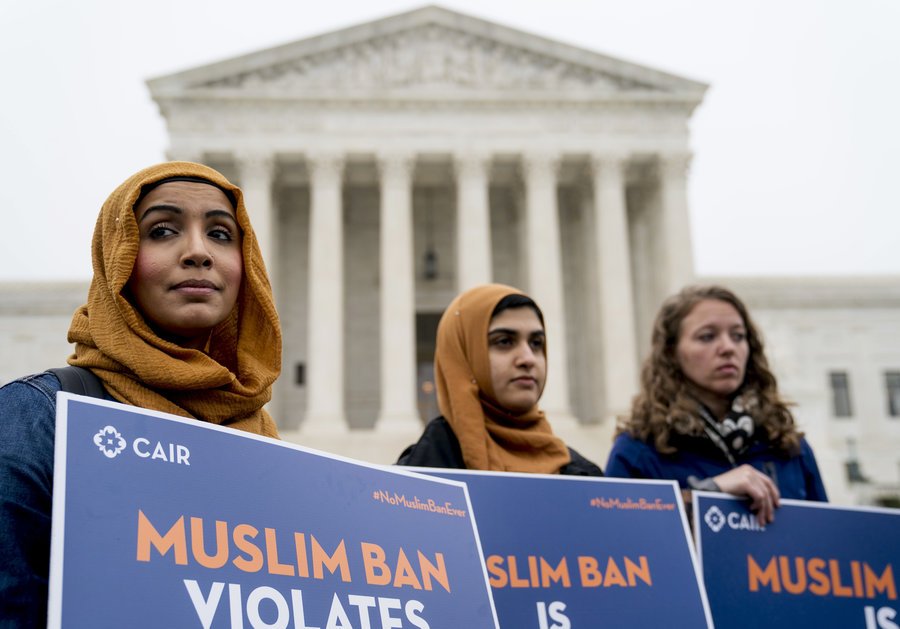Opponents conceded the supreme court had delivered a significant blow to their efforts with its 5-4 ruling in favour of Donald Trump’s travel ban on several Muslim-majority countries. But groups that challenged Trump’s policy told the Guardian they were already preparing “the next front” of legal challenges. Until then, travellers from five Muslim-majority countries will continue to be overwhelmingly barred from entering the United States.
What does the ruling mean for travellers?
The supreme court weighed the legality of the third iteration of Trump’s travel ban, which sought to bar or limit immigrants from Iran, Libya, Syria, Somalia, and Yemen. North Korea and Venezuela were also among the countries listed in the ban, but their presence was not challenged in court.

As it awaited oral arguments, the court enabled Trump’s third executive order to go into effect last December. Although the administration has argued it was not banning travel from the list of countries entirely, the state department’s own numbers have shown a minimal number of exceptions have been granted.
Citizens of the banned countries can apply for waivers on a case-by-case basis, such as seeking to travel to the US for medical treatment, to visit a close family member or for business obligations. But of more than 8,400 applicants between 8 December and 8 January, only 128 travellers from the banned countries qualified, according to Reuters. In the initial weeks, only two visa waivers were granted.
Doug Lasdon, executive director of the Urban Justice Center, said the supreme court’s ruling would embolden the Trump administration to “go hard at immigrants” on a not-so-subtle basis of nationality or religion.

“I think this is open season for them,” Lasdon said. “This supports the president’s most authoritarian instincts.
“The borders are closing and they’re closing fastest on people of colour and the Muslim religion.”
 [It is] a moment of profound vindication following months of hysterical commentary from the media and Democratic politicians who refuse to do what it takes to secure our border and our country.”
[It is] a moment of profound vindication following months of hysterical commentary from the media and Democratic politicians who refuse to do what it takes to secure our border and our country.”
- White House statement
What do travel ban opponents plan to do now?
The groups who led the legal challenge to the travel ban expressed dismay at the supreme court’s decision, particularly in light of Trump’s vow as a candidate to ban all Muslims from entering the US and record of derogatory comments about Islam and its followers.
“Unfortunately, the supreme court has given its blessing to anti-immigrant, anti-Muslim animus,” said Esther Sung, an attorney at the National Immigration Law Center.
 Immigrant rights advocates said the travel-ban ruling is bound to fortify Trump’s conviction to accelerate the administration’s efforts to choke off legal avenues for refugees, foreign students and temporary workers, all of whom have been confronted with new hurdles for entry.
Immigrant rights advocates said the travel-ban ruling is bound to fortify Trump’s conviction to accelerate the administration’s efforts to choke off legal avenues for refugees, foreign students and temporary workers, all of whom have been confronted with new hurdles for entry.
Some set their sights on Congress in the hopes that federal lawmakers might overturn the travel ban through legislation.
“We must make it crystal clear to our elected representatives: if you are not taking action to rescind and dismantle Trump’s Muslim ban, you are not upholding this country’s most basic principles of freedom and equality,” said Omar Jadwat, director of the Immigrants’ Rights Project at the American Civil Liberties Union.
A legislative fix would be unlikely, given Republicans in Congress have been broadly supportive of Trump’s policy. And even if Democrats were to retake control of the House and Senate in November’s midterm elections, the president would assuredly veto any bill seeking to undo his travel ban.
Immigration groups suggested the path forward might be challenging the visa waiver process and demonstrating that the Trump administration was not admitting travellers who met the exemptions laid out in the executive order. That could mean trying to chip away at aspects of the travel ban until another president could reverse it.
But by and large, the travel ban’s opponents struggled to come up with any immediate answers.
 Today’s ruling affirms once and for all that, despite false claims in the media and from the left, this practical policy is squarely within the President’s authority.”
Today’s ruling affirms once and for all that, despite false claims in the media and from the left, this practical policy is squarely within the President’s authority.”
- Steve Scalise | House Majority Whip
“It’s sad to say this,” Lasdon said, “but if you are Muslim, you have to think twice about coming to this country.”
How is the Trump administration responding?
The president boasted of a “tremendous victory for the American people” shortly after the supreme court’s decision was handed down.
 Today’s decision goes against fundamental American values, and by further damaging our reputation overseas, hurts the national security of the United States.”
Today’s decision goes against fundamental American values, and by further damaging our reputation overseas, hurts the national security of the United States.”
- Sen. Robert Menendez | Democrat from New Jersey
It was not immediately clear if the ruling would change the way in which the policy will be implemented moving forward. The Department of Homeland Security did not immediately respond to the Guardian’s request for greater clarity.
In an earlier public statement, the DHS said: “President Trump’s executive actions take important steps to protect the American people by allowing for the proper review and establishment of standards to prevent terrorist or criminal infiltration by foreign nationals.”
“Today’s ruling confirms the legality of these critically important executive actions,” the statement added.









